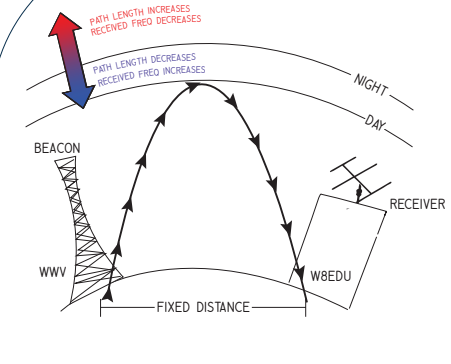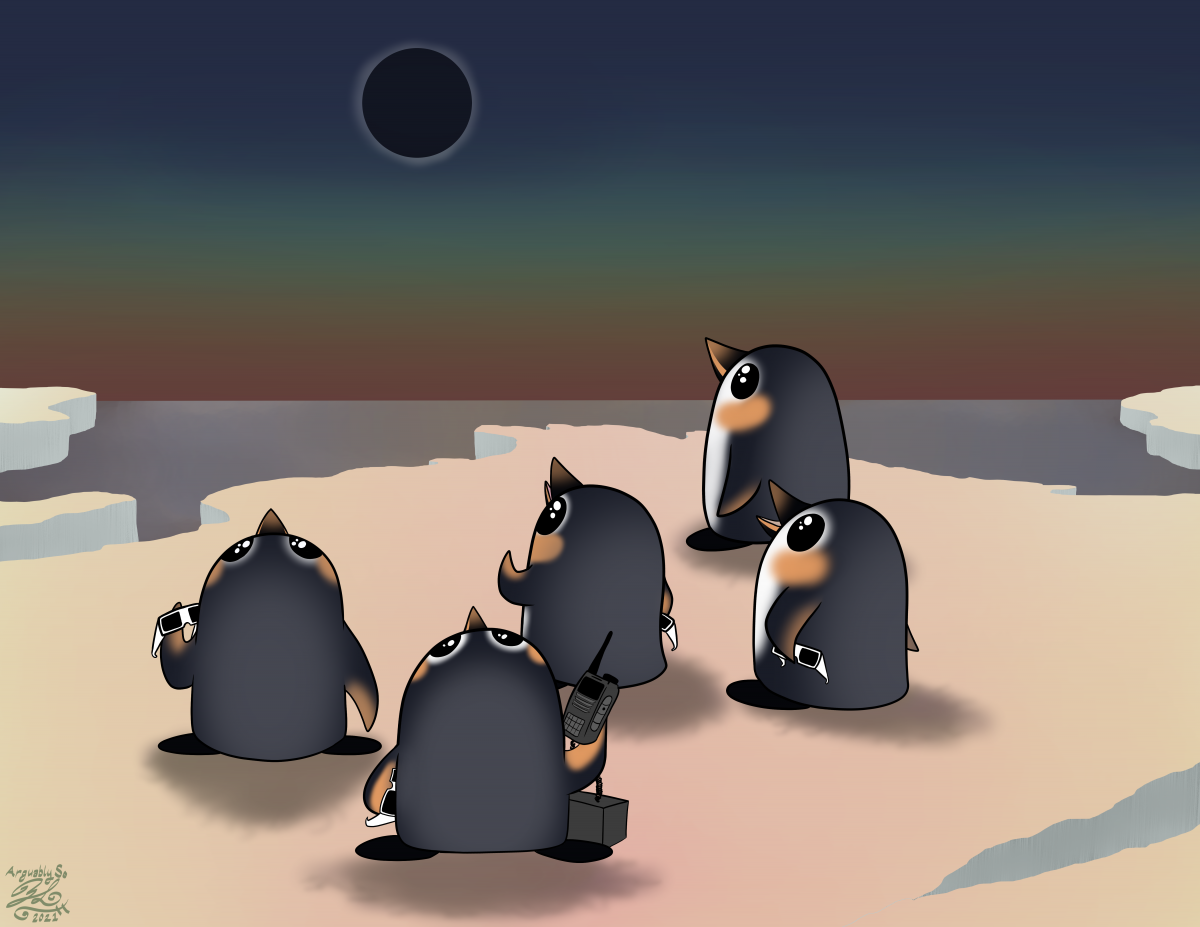December 2021 Eclipse Festival of Frequency Measurement
Calling all stations: Join us for
The December 2021 Antarctic Eclipse Festival
Introduction

Contact information:
Kristina Collins: kd8oxt@case.edu
Objectives
- Promote international goodwill by working with citizen scientists around the globe
- Develop and test new software for data recording and analysis
- Measure Doppler shifts caused by space weather's effects on the ionosphere
Research Questions
- What traveling ionospheric disturbances are produced by the eclipse, and can they be measured by citizen scientists?
- What conjugate effects are produced by the eclipse, and can they be measured by citizen scientists?
______________________________________________________________________________________________________________
Software Projects
If you would like to help test an existing project, look at the project list below and contact the lead for a project that looks interesting. Project leads are responsible for maintaining a list of software testers.
If you would like to develop a project, email hamsci@case.edu with the subject line "Eclipse Festival Software Project." Include the following information:
- Project name
- Names, callsigns, and ORCIDs of development team
- Names, callsigns, and ORCIDs of testing team, if applicable
- Brief description and current status
- Project URL (i.e., a Github link)
- Contact information for the project lead developer, for participants interested in helping with testing.
Project List
A list of software projects will go here.
SNASH (SNASH Nimbly Archives Sound Headers)
Project Description: A Fall 2021 senior project at CWRU to replace Audacity for metadata recording.
Development Team: Zachary Kadish  , Martin Bui, Daniel Warner, Shivvanandh Mohan
, Martin Bui, Daniel Warner, Shivvanandh Mohan
Testing Team: TBD
Current Status: In development; will be seeking testers shortly.
Project URL: www.hamsci.org/snash
SDR Recording with GNU Radio
Project Description: A GNU Radio flowgraph for measuring Doppler with your SDR.
Development Team: Marcus Leech
Current Status: Available for use. (If you record I/Q data, please post it to Zenodo or upload it below in a zipped file with a text document describing your setup.)
Project URL: https://github.com/ccera-astro/wwv_doppler
Contact Information: https://chat.gnuradio.org/#/room/#wwv:gnuradio.org
Live Audio Carrier Detection with GNU Radio
Project Description: A GNU Radio flowgraph for measuring Doppler from audio using the PLL Detection function, as a flexible alternative to fldigi.
Developers and Testers: K0ZEL, KD8OXT, PE1MJA
Current Status: Testing existing code. Next steps: CSV logging, sideband detection.
Project URL: https://zenodo.org/record/5725910
Contact Information: https://chat.gnuradio.org/#/room/#wwv:gnuradio.org
WWV/H Test Signal Analysis
Project Description: A special test signal is being transmitted on WWV/H to characterize the transmitters. The current version of the signal will run through January 30.
Development Team: WWV/H Scientific Modulation Working Group
Current Status: Looking for ways to compare signal recordings (https://zenodo.org/record/5715673) to the ground truth (https://zenodo.org/record/5602094), and to develop citizen science experiments using the test recording.
Project URL: https://hamsci.org/wwv
Contact Information: kd8oxt@case.edu or https://chat.gnuradio.org/#/room/#wwv:gnuradio.org
hamsci-202112-freqdata
Project Description: This repository contains a brief analysis result and the scripts (of shell, R, awk, etc.) used to obtain the frequency/amplitude data from the daily recorded output of Grape 1 (and any receiver applicable with 8kHz WAV file). I've been developing this set of scripts since the last year's December 2020 Festival. You need to specify the WAV filename, starting time (in UNIX/POSIX epoch), and pitch difference in ppm (which can be measured by how much *actual* time was spent for 86400*8000 samples of the WAV file (supposed to be one day if the recording timing has no error).
Development Team: Kenji Rikitake, JJ1BDX 
Current Status: So far successfully made analysis of the data during 1 to 6 December 2021. The results are given in the own graphs and fldigi-compatible daily analysis data, as well as the text value files of frequency and amplitude information.
Project URL: https://github.com/jj1bdx/hamsci-202112-freqdata
Contact Information: Please use GitHub issues at https://github.com/jj1bdx/hamsci-202112-freqdata.
Software Tools
If you are interested in working on a software project, these tools will be of use to you:
GNU Radio
GNU Radio is a free, open-source platform for digital signal processing. It will be used in several of the software projects.
Installation Guides: https://wiki.gnuradio.org/index.php/InstallingGR
Tutorials: https://wiki.gnuradio.org/index.php/Tutorials
Chat Channels: chat.gnuradio.org
Zenodo
Zenodo is a FAIR Data repository which can be used to store referenceable files. Eclipse Festival participants are encouraged to submit datasets to Zenodo and include them in the HamSCI community page there, so that they may be easily listed and referenced later.
______________________________________________________________________________________________________________
Regular Data Collection
Times
- Data recording starts: 01 December 2021, 0000 UTC
- Data recording ends: 10 December 2021, 2359 UTC
How to Participate
1) Sign up on the Eclipse Festival mailing list: https://groups.google.com/g/eclipse-festival
2) Collect data according to the instructions on this page: hamsci.org/doppler-instructions
3) Upload your data to Zenodo or submit it via the link below.
4) Fill out the exit survey at the bottom of this page.
______________________________________________________________________________________________________________
Frequently Asked Questions
Why this shift in focus?
While previous Eclipse Festivals have focused on crowdsourced data collection, the goal is to move to a truly co-designed citizen science model. Also, themes are fun.
Can I still collect data using audio or fldigi as I have in the past?
Yes! Follow the instructions from previous events, and upload your data here. Make sure to follow the filename convention! Your data cannot be analyzed if it isn't possible to tell who took it and when. If you have an unusual data format or a folder containing notes, send a zipped folder with a text file describing your station. Also, consider posting your data or work to zenodo.org and submitting a text document linking to the DOI number.
Can software projects continue beyond the duration of the Eclipse Festival?
Yes, althoiugh this page will be closed and the list of software projects compiled on January 30th.

